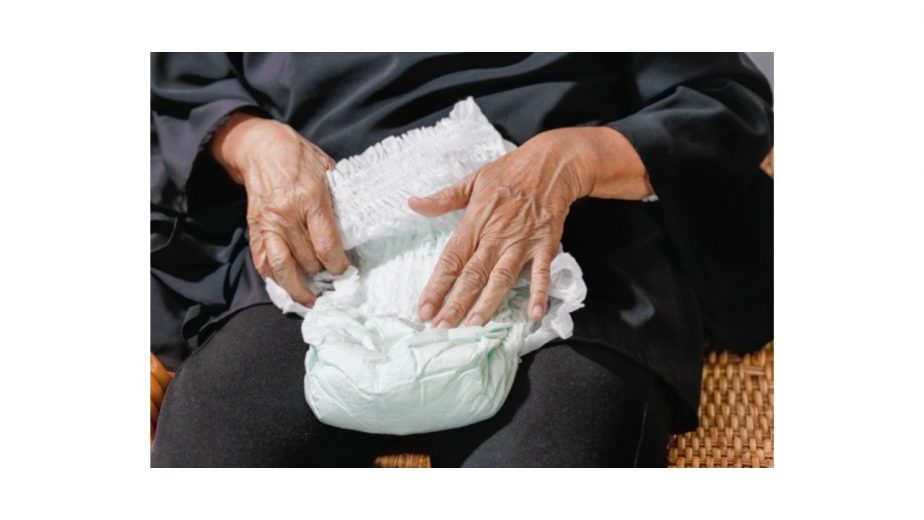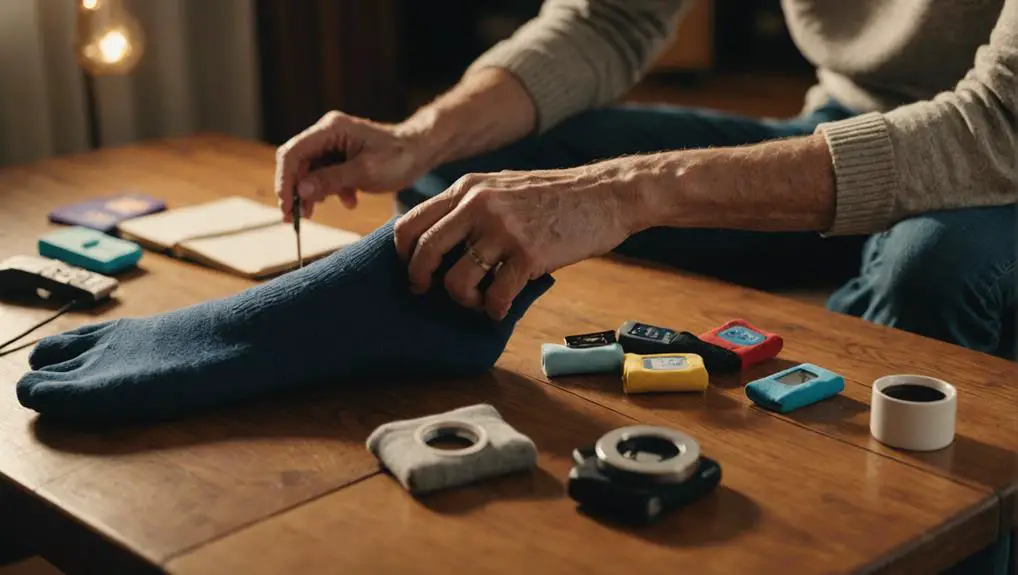Taking care of elderly and dementia patients is not easy. Many people with dementia or Alzheimer’s experience incontinence. It only makes it harder to look after them. However, it is not impossible.
There are certain tips that you can follow to make your life easier. There is nothing wrong with helping patients manage incontinence. It is important that they keep their diapers on.

Also, you have to check out my post on the Best Fitness Trackers & Smartwatches For Elderly, Blind & Visually Impaired
Incontinence is a condition that most people do not want to accept or deal with. It is common for seniors to ignore such a development.
Instead, they would simply carry on with their lives, pretending as if they do not suffer from the condition. Patience is necessary when dealing with them as you must uphold their dignity.
Table of Contents
Why Dementia Patients Take Their Clothes Off?
The elderly and dementia patients behave in a particular way. You need to understand their behavior. When you determine what might be their trigger, you get to prevent it. The following reasons explain why dementia patients take off their clothes.
- Confusion: One of the main reasons why dementia patient might take off their clothes is because they might confuse the identity of people around them. For instance, they might mistake the care worker or child as their partner and behave inappropriately.
- Discomfort: Another reason for undressing in public might include feeling discomfort. For example, the clothes might make the patient feel too hot or be too tight. Thus, they would remove their clothes to feel comfortable again. Handling the genital area can lead to itching and urinary tract infections.
- Forgetfulness and Loss of Skills: It is also possible for the patient to forget where they are and not know that it is inappropriate to take off their clothes. They might just need to urinate and not know how to use the bathroom or where it is. The brain damage might be the reason behind the lack of judgment leading to inappropriate behavior.
- Disorientation: The patient might also not realize what time it is and think they are getting ready for bed or a bath. They might think that they are in their bedroom or bathroom and take off their clothes.
How to Get Elderly and Dementia Patients to Wear Their Diapers and keep them on?
If you struggle to convince the elderly and dementia patients to wear diapers or clothing, you need to consider the following.
1. Learn to Communicate Effectively
There is a way to talk about leaks or incontinence to patients without upsetting them. You need to avoid drawing unnecessary attention to the matter and remain calm at all times. Be understanding towards your patients as they do not have control over their behavior. For instance, if they experience a leak, you can say something like the following.
- It seems that your pants have gotten wet. Sometimes, it happens to the best of us.
- Accidents always happen. There is no need to worry.
- I think you might have spilled something onto your pants. It might be best that we get you some clean clothes.
2. Introduce Incontinence Products
The next thing you need to do is introduce incontinence products. Now, you might be wondering what might be the best way to do so. It is a good idea to introduce the products as disposable or padded underwear. Their pull-up design makes them seem like regular underwear. There is no need to mention the words “incontinence” or “diaper.” It might be better to use words like “spills” or “leaks.” As for the diaper, you should stick to “brief” or “pull-up underwear.”
However, if the patient refers to them as diapers, you do not have to worry about calling them something else. If they use the term “diapers,” you can follow suit. You just have to follow their lead. But, if they do not do so, you should not use the said term as it would only cause embarrassment or shame.
If you encounter resistance, you should mention that absorbent underwear offers protection in case you do not make it to the toilet within time. There are also times when older patients might not be able to notice the difference between an absorbent pull-up style and actual underwear. If this is the case, you can replace regular underwear from the drawer and place absorbent pull-on styles instead.
Another post that will interest you is about the Adaptive Equipment for Golf Playing Disabled & Elderly.
3. Choose the Best Incontinence Products
If you want elderly and dementia patients to keep diapers on, you need to choose the best incontinence products. It is important to keep in mind that there are companies that provide free samples of their incontinence products. This means that you can take advantage of these samples to determine the best size and absorbency to ensure that your patients use the perfect incontinence products. When you use the free samples, you also get to save money and ensure that your patients feel comfortable and do not remove the products. You can even reach out to a company representative to seek expert advice on choosing the best incontinence products for older adults.
4. Help Patients Get to the Bathroom on Time
The next thing you need to do to ensure that your elderly and dementia patients keep their diapers on is to help them get to the bathroom on time. This is especially important during the night. Make sure that the path to the toilet is as short as possible. There should also be no obstacles in the way as they would lead to nighttime falls. You should make it a priority to make things easy for patients so that they do not take off the diapers and urinate outside the toilet.
Always remember that even simple changes go a long way. For instance, you can leave the bathroom door open, create a designated path using duct tape or nightlights, and install a light-up toilet seat. Each of these will help patients head to the bathroom rather than taking off their diapers in front of everyone. In certain cases, it might also be necessary to place a bed pad in the bed so that your patients manage to get proper sleep without having to get up every hour or so to go to the toilet.
5. Consider Using Super Absorbent Products
Things can get very hard during the night. Older adults have a tough time with leaks. Not only would they wake up in the middle of the night, but they would also wake up everyone else. Older adults must remain dry at night. However, super-absorbent products are here to help you out.
Get the best absorbent products in the market, such as booster pads. These can be placed inside the absorbent underwear for offering extra coverage. You can also use a waterproof mattress protector and disposable bed pads or layer absorbent, washable pads as they help minimize bedding changes and are super effective. You might consider these products to be overkill. But, it is always better to be prepared than sorry. It would help ensure that there is less laundry in the morning and that your patients benefit from better sleep.
If there is a leak, make sure that necessary products are nearby. You will require disposable bags, different clothes, absorbent underwear, skincare products, and bed-like wipes for handling the leaks. Thus, you would not need to search for things in the middle of the night and worry about where you have placed everything.
6. Consider Waterproof Underwear Covers or Adult Bodysuit with Snaps
If you are still struggling to get your older and dementia patients to keep their diapers on, you might need to consider waterproof underwear covers or an adult bodysuit with snaps. You should use these garments because they can be quite challenging to remove compared to underwear covers and absorbent briefs. You also get to add a layer of leak protection by incorporating these items. Keep in mind that some absorbent briefs use stronger adhesive tape.
Avoid getting briefs that have hook and loop fasteners, as these tend to be easy to remove. It will help ensure that the underwear stays in place. Moreover, you might also need to change brands to improve dryness and comfort so that your patients do not remove the briefs.
7. Opt for a Super Absorbent Brief If Patients Refuse to Change Their Absorbent Underwear
When you deal with older and dementia patients, you will also encounter some that simply refuse to change their absorbent underwear. In such a case, you should get them to wear super absorbent briefs as they offer protection throughout the day, or you can also go with booster pads as these add protection to the absorbent underwear.
Conclusion
Once you have finished reading the post, you will know why dementia patients remove their clothes and how you can get them to keep their diapers on. Make sure that their skin is protected by using a rash cream or moisture barrier.
It will help prevent irritation. By following our tips, you will no longer struggle with elderly and dementia patients who cannot keep their diapers on.

Hi, my name is Eddie, I am a professional trainer specializing in the elderly population and I’m also a website designer. I love training in the gym, going to the beach, traveling, and having good food.
I combined my love for sport and website designing to make “DisabilitEase” whose purpose is to help elderly and disabled people live a more full and active life, have more fun, and enjoy their unique journey despite any disability.


